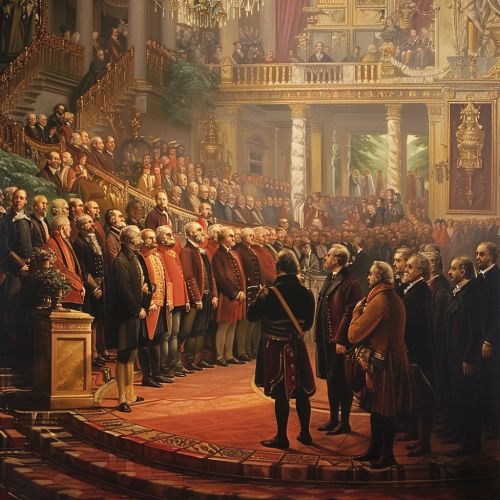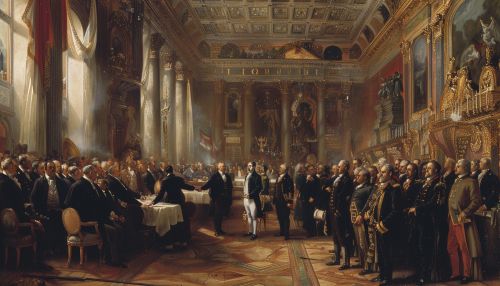Protestant Union
Protestant Union
The Protestant Union, also known as the Evangelical Union, was a coalition of Protestant German states formed in 1608 in response to the growing power of the Catholic League and the increasing influence of the Habsburgs within the Holy Roman Empire. This alliance was a significant political and military force during the early 17th century, playing a crucial role in the complex religious and political landscape of the period.


Formation and Objectives
The Protestant Union was established on May 14, 1608, in the city of Auhausen, Bavaria. The immediate catalyst for its formation was the perceived threat posed by the Catholic League, which had been founded in 1609 under the leadership of Duke Maximilian I of Bavaria. The Protestant Union sought to protect the rights and territories of its member states against Catholic aggression and to ensure the continued practice of Protestantism within the Holy Roman Empire.
The Union was initially composed of several key Protestant states, including the Electoral Palatinate, Württemberg, and Baden-Durlach. The leadership of the Union was vested in the Elector Palatine, Frederick IV, who played a pivotal role in its establishment. The Union's objectives were both defensive and offensive, aiming to provide mutual military support among its members and to counterbalance the power of the Catholic League.
Political and Religious Context
The early 17th century was a period of intense religious conflict in Europe, marked by the fragmentation of Christendom following the Protestant Reformation. The Holy Roman Empire, a patchwork of semi-autonomous states, was particularly affected by these divisions. The Peace of Augsburg (1555) had attempted to provide a temporary resolution by allowing each prince to determine the religion of his own state (cuius regio, eius religio). However, this peace was increasingly fragile as tensions between Protestant and Catholic states escalated.
The Protestant Union emerged against this backdrop of religious strife and political maneuvering. The Union's formation was a direct response to the Catholic League's aggressive stance and the Habsburgs' efforts to centralize power within the Empire. The Union sought to preserve the religious and political autonomy of its member states and to resist any attempts at forced re-Catholicization.
Military Engagements and the Thirty Years' War
The Protestant Union's military capabilities were tested during the early stages of the Thirty Years' War, a protracted and devastating conflict that engulfed much of Europe from 1618 to 1648. The war began as a struggle between Protestant and Catholic states within the Holy Roman Empire but quickly expanded into a broader European conflict involving multiple powers.
One of the Union's first significant military engagements was the Battle of White Mountain in 1620. This battle was a decisive defeat for the Protestant forces, leading to the collapse of the Bohemian Revolt and the consolidation of Habsburg power in Central Europe. The Union's inability to secure a victory at White Mountain marked a turning point in the war and underscored the challenges faced by the Protestant coalition.
Despite this setback, the Union continued to play a role in the conflict, providing support to various Protestant factions and seeking alliances with other anti-Habsburg powers, such as Denmark and Sweden. However, internal divisions and the lack of a unified command structure hampered the Union's effectiveness, and it struggled to mount a sustained military campaign against the Catholic League.
Decline and Dissolution
The Protestant Union's influence waned as the Thirty Years' War progressed. The Union faced significant challenges, including financial difficulties, internal discord, and the loss of key territories. The defeat at the Battle of White Mountain had already weakened the Union's position, and subsequent military setbacks further eroded its strength.
In 1621, the Union was formally dissolved following the Treaty of Mainz. This treaty marked the end of the Union's military alliance and the withdrawal of its member states from active participation in the conflict. The dissolution of the Union reflected the broader fragmentation of the Protestant cause within the Holy Roman Empire and the shifting alliances that characterized the Thirty Years' War.
Legacy and Historical Significance
The Protestant Union's legacy is complex and multifaceted. While the Union ultimately failed to achieve its primary objectives, its formation and activities had a lasting impact on the political and religious landscape of early modern Europe. The Union's efforts to resist Catholic hegemony and to preserve Protestant autonomy contributed to the broader struggle for religious freedom and political self-determination within the Holy Roman Empire.
The Union's experience also highlighted the challenges of coalition-building and the difficulties of maintaining a unified front in the face of external threats and internal divisions. The lessons learned from the Union's successes and failures would inform subsequent efforts to forge alliances and to navigate the intricate dynamics of European politics.
